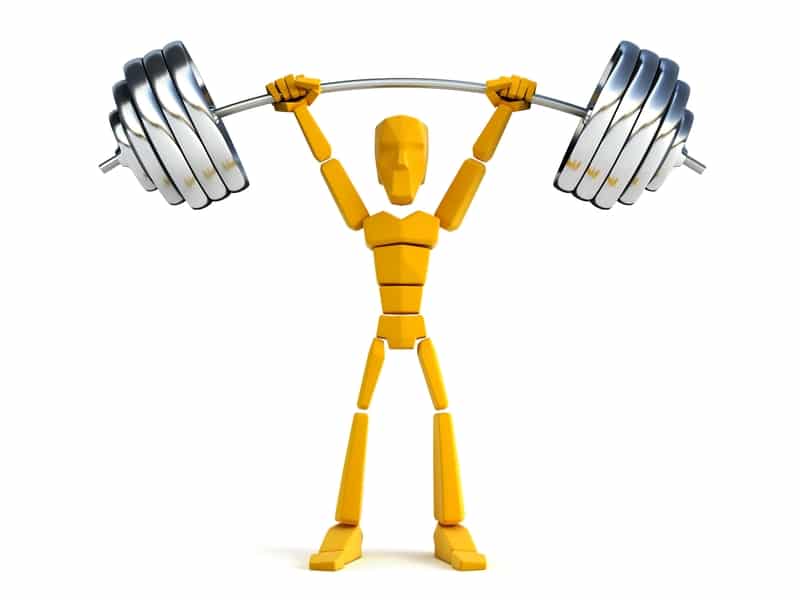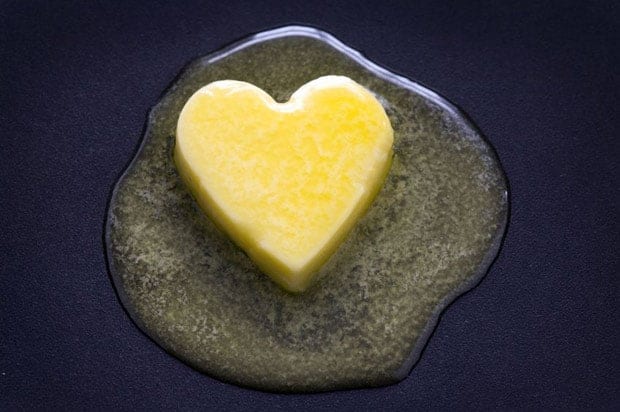Protein is essential for building, repairing, and maintaining the human body. It’s such an important nutrient that it’s actually responsible for the results we see in our genetic expression. This means that the diseases you have (or don’t have) and the size and shape of your body are determinant upon the action of proteins in your system.
The whole trouble is when we take such a complex form of health and nutrition, and lump it all under this label called “protein.” What proteins are, and what they do, are as variant and complex as anything in nature.
Proteins are sequences of amino acids (building blocks) that come together to create structure and functions. The reason that animal proteins (like meat) are so highly touted for being high in protein is the occurrence of the amino acids that have been utilized by the animal to form their flesh.
Obviously the word is out now that all proteins are not created equal, and the source of your animal products is far more important than whether or not it’s considered a good source of protein. If you eat ruminants like cow and bison, then you need to be sure it’s not diseased by being fed an inappropriate diet. It must be grass-fed, and grass- finished to even qualify as an appropriate food to feed anyone.
The reason that so many people are able to thrive on a vegetarian diet is that fact that these amino acid (building blocks) are found in thousands upon thousands of different foods other than the standard chicken breast.
Even though animal flesh is heavy in amino acids, many people make the switch over to vegetarian sources because of the energetic quality of the meat, and the inherent pain and death that comes along with it.
What you are provided with here are 10 excellent sources of vegetarian protein, so that you can take advantage of some cleaner-burning fuels, and build your body out of intelligent building blocks.
1. Spirulina – Spirulina has the highest concentration of protein of any known food at 65 to 71 percent protein by weight. Spirulina made the list because of it’s time-tested historical value of being the primary protein source for the people of Mexico City for THOUSANDS of years. It’s also a rich source of antioxidants, nucleic acids (DNA and RNA), enzymes, and polysaccharides.
2. Chlorella – Chlorella contains about 60 percent digestible protein, which far exceeds animal foods like beef and chicken (at just 18 to 30 percent). Chlorella is a single-celled, water grown algae that tends to be much more digestible than other high protein algae for most people. Chlorella contains more chlorophyll per gram than any other food, which is exactly how it’s name was derived. It’s an excellent detoxifier of heavy metals and pesticides from the body. Chlorella is also rich in calcium, antioxidants, RNA, and Chlorella Growth Factor (CGF) which is a potent body builder.
3. Hemp Seeds – Over 35 percent digestible protein by weight. Hemp seeds contain the greatest amount of edestin which is widely regarded as the most digestible form of protein for the human body. Hemp seeds are also provide a nearly perfect ratio of Omega-3 and Omega-6 fatty acids.
4. Bee Pollen – Bee pollen has all 22 known amino acids. It’s one of the highest sources of concentrated protein found anywhere in nature. Bee pollen is noted to increase muscle growth and definition. It’s rich in antioxidants, nucleic acids, minerals, and polysaccharides.
5. Colostrum – Colostrum is factually nature’s first food for mammals. This critical “first milk” is what provides the essential protein and growth factors that triggers our first boost in development. Why this is such a relevant food right now is the fact that colostrum is scientifically proven to be 3 times more effective against illness than flu vaccines. When a human is born, and doesn’t receive the colostrum from their mother, they are missing out on the critical antibodies and immune weapons that set the structure for the person’s health throughout their entire life. Your thymus gland is the master regulator of your body’s immune system. When you’re born your thymus is the size of a small orange, but for most people by the age of 40, it’s shrunken to the size of a pea! Colostrum is scientifically proven to REGROW your thymus gland. It has 87 different growth factors, every known amino acid, and every essential fatty acid. This is nature’s most complete food, period.
6. Blue-Green Algae – AFA Blue-Green Algae is a truly wild food that contains excellent amounts of antioxidants, minerals, nucleic acids, and amino acids. It’s a complete protein that’s 60 percent protein by weight. It also contains an impressive amount of the rare antioxidant phycocyanin, which helps protect against free radical damage and assists in the attachment of one amino acid to another.
7. Raw Milk and Yogurt – All nutrients depend upon other cofactors for them to be assimilated. Vegetarians utilize milk as a source of complete protein because it also provides the Vitamin A and Vitamin D that are needed to actually assimilate the proteins. When milk is pasteurized it is heated to temperatures that destroy the delicate proteins and minerals that would be found in it. Homogenization destroys the butterfat globules (so the cream does not “rise to the top”), and this process has actually been linked to heart disease. Dairy has been a staple food for societies for thousands upon thousands of years. If you’re going to utilize dairy foods, check out the Weston Price Foundation Website to connect with farmers in your area who are providing organic, REAL raw milk. RealMilk.com
8. Eggs – The storied history of the value of eggs can be dated back to images carved on Egyptian Pyramids. Eggs are a very rich protein food, and because of this they’re often mistaken as being part of the “meat group”. In actuality an egg is simply one complete cell, and a multitude of vegetarians utilize eggs because no killing is actually taking place. This one complete cell provides critical nutrients that are hard to find in a vegetarian diet. Eggs are one of the only known food sources of Vitamin D, Vitamin A, and muscle building lecithin.
9. Quinoa (Pronounced Keen-wah) – For thousands of years the people of South America have enjoyed the strength and endurance that are provided by eating quinoa. This is the highest protein grain on the planet, providing all 9 essential amino acids. Quinoa was once known as “The Gold Of The Incas,” and it’s now making a reemergence as a valuable alternative to genetically modified wheat, corn, and soy products.
10. Maca – Maca is a remarkable cruciferous vegetable that contains 20 different amino acids. It’s a well known fertility food, adaptogen, and aphrodisiac. Maca is a rich protein food that helps to regulate the endocrine system. It’s well documented to help fortify the immune system and promote the production of healthy hormones.
Other notable sources of protein are Marine Phytoplankton, Goji Berries, heirloom beans, almonds, walnuts, pumpkin seeds, and chia seeds.
Leave your comment below and share what your favorite source of protein is. Was something left off the list that you think needs to be there? Share it in the comment section below.







Hi Shawn,
When this topic is brought up, a lot of the time beans are mentioned as a great alternative. I am not talking about soy beans, but instead black beans and navy beans. Which can be soaked to relieve them of many of the anti nutrients.
What are your thoughts on beans as a source of vegetarian protein?
Hey Shawn,
Really enjoy your podcast. Enjoy eating quinoa but recently I read articles people saying it’s not good for you. What information can you provide us on these opinions?
Miguel, I appreciate it so much. Have you heard this episode about “Gluten-free” foods? -> https://themodelhealthshow.com/dangers-eating-gluten-free/ I cover quinoa in it. It’s a question that a lot of people have. Plus, there’s a lot of other important insights to navigate this new gluten-free approach.
Thanks Shawn. It was really insightful. I like how you said test to see how it affects your body. Any cookbooks that you would recommend out there?
Can I simply say what a aid to find somebody who actually is aware of what they’re speaking about on the internet.
You undoubtedly know how to carry a problem to gentle and make it important. More individuals have to read this and perceive this facet of the story. I can’t consider you’re not more fashionable because you undoubtedly have the gift.
Thank you, I really do appreciate that 🙂
Shaw,
I’ve got to hand it to you; this by far the most informative website that I’ve been on. Your delivery regarding health and life-promoting products is just amazing. I just finished watching your video on the best source of protein. I have three questions regarding it…ok, maybe 4. I am looking to add 10 pounds to my frame. Currently 5’6 126 pounds. I’ve been drinking my own fresh hemp milk (without straining) on a daily basis, flax seed oil, coconuts, avocados, nuts, etc.
Question1: Do you recommend the actual hemp seeds or the hemp protein powder?
Question2: What is a good rule of thumb for someone (male & female) who’s looking to increase their protein intake? Is it half your body weight in grams of protein?
Question3: I saw that spirulina is an amazing source of protein but when I look at the grams of protein per serving it’s very low…How do I get the recommended about of protein (for weight gain) from spirulina? How much is too much?
Sorry for the lengthy comment but everyone that I seem to talk to have absolutely no knowledge of vegan sources of protein.
Keep doing what you are doing.
Peace
I’m glad i read this, too. One of the main reasons was to learn about colostrum. As for the whey protein…i’ve been there done that and i believe still somewhat paying for it years later. I didn’t know that much about it and got it from either GNC or Wal-Mart and stuck close to the recommended dosage, and though i did feel stronger to lift heavier weights(creatine), i also gained other weight in areas i didn’t want and its a stubborn kinda weight. Personally, i’d veer from that stuff and stick with healthier options, like the article above. It’s exciting to learn about alternatives and some of the best sources out there available.
That was definitely my experience using creatine and whey as well… Increases in strength, but the body composition didn’t last long at all as soon as I stopped lifting weights. What we want to do is to focus building our bodies out of sustainable materials, so that each brick we lay down is next to impossible to fall apart. This is so much more possible with real whole foods, superfoods, and superherbs. We’re passing our vote for the things that have gotten results for thousands of years, rather than the new designer supplement of the day.
I just finished talking to one of my co workers about what proteins I could take to help me build definition and strength. I saw this email and I’m glad I did. I was going to buy Whey Protein Isolate to start, but now I’m not so sure. BUT I’ll for sure snatch a few of these items to help with the process too.
Thanks
Great choice, Tiffany. I would really be weary of 99% of the Whey protein products on the market today. It’s always the best idea to use complete foods to get your protein requirements because it has all of the other nutrients intact that help with assimilation.
Colostrum is a fantastic whole food with every single known amino acid. That would be the first place I’d look. And of course picking up some of the Sun Warrior Protein. I made this available on out site because it’s a whole brown rice biofermented protein. It’s highly bioavailable, and it just feels good, as compared to whey and other protein powders. It’s definitely one of my favorite things, and you can easily pick some up on the products page here on the site. Have a scoop of that along with the colostrum and WOW! This is one of the things I use most days to keep my body strong and regenerating.